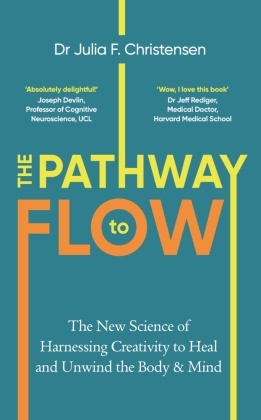
The Pathway to Flow - The New Science of Harnessing Creativity to Heal and Unwind the Body & Mind
| Verlag | Random House UK |
| Auflage | 2024 |
| Seiten | 352 |
| Format | 13,5 x 2,6 x 21,3 cm |
| Trade paperback (UK) | |
| Gewicht | 352 g |
| Artikeltyp | Englisches Buch |
| EAN | 9781529912302 |
| Bestell-Nr | 52991230UA |
_HARNESS THE POWER OF FLOW IN 2025: NEW YEAR, NEW YOU_
'Wow, I love this book!' Dr Jeff Rediger, Harvard Medical School | 'Absolutely delightful' Joseph Devlin, Professor of Cognitive Neuroscience, UCL | 'I thoroughly recommend reading this beautiful book' David Robson
Whether you feel in the zone by playing an instrument, cooking, drawing, dancing or crafting, research shows that just 15 minutes a day channelling creative "flow" can transform your life. Using neuroscience and inspiring stories of everyday artists, Dr Christensen uncovers how the coveted flow state can help you experience mindfulness benefits without meditating.
After an injury derailed her career as a ballet dancer, Julia's inability to dance left her more stressed and less energetic. She realised then that creative expression has a deeper impact than entertainment: this sparked her new career in psychology. As a neuroscientist, she's spent the past decade unlocking the secrets of flow, m apping out what happens in our brains when we create and play, and how both can soothe and sharpen the mind.
This book teaches us to ignite our creativity daily, revealing:
- Why we ruminate or procrastinate - and how to snap out of it
- Why making even 'bad' art can be a mood booster
- How adopting a creative practice can improve problem-solving
- How to build a science-backed practice that suits you best
- Why art can be your trusted companion during trauma-healing
The Pathway to Flow reveals why we are all artists at heart, and how embracing this part of our humanity can help us regulate our nervous system, enjoy the current moment and reconnect with our bodies.
Rezension:
Fascinating, engaging, fun, astonishing and absolutely delightful! I enjoyed every minute of this fabulous book. I learned a lot, both about the science of flow and its relation to the arts, but also about writing well. Professor Joe Devlin, former head of Experimental Psychology at UCL
